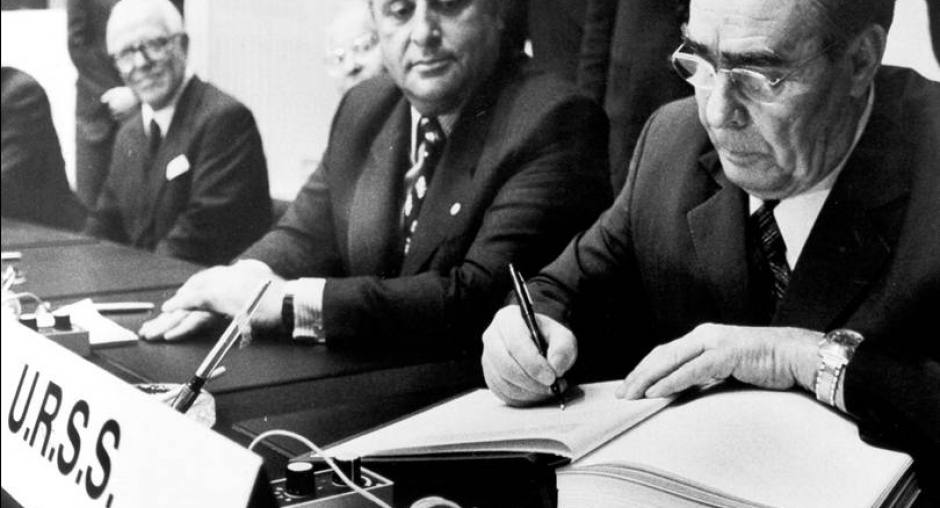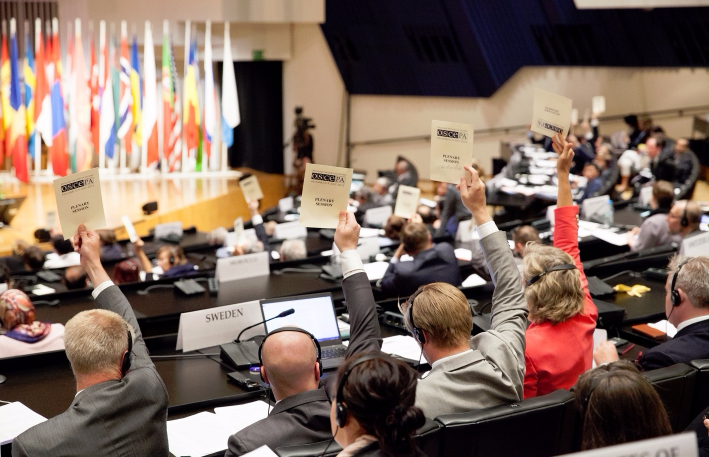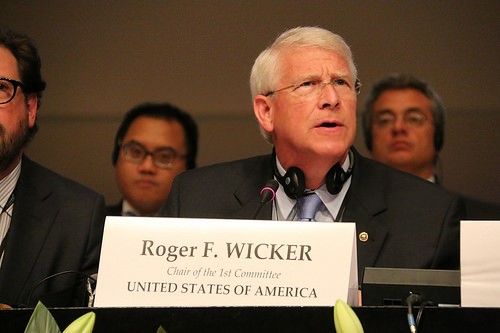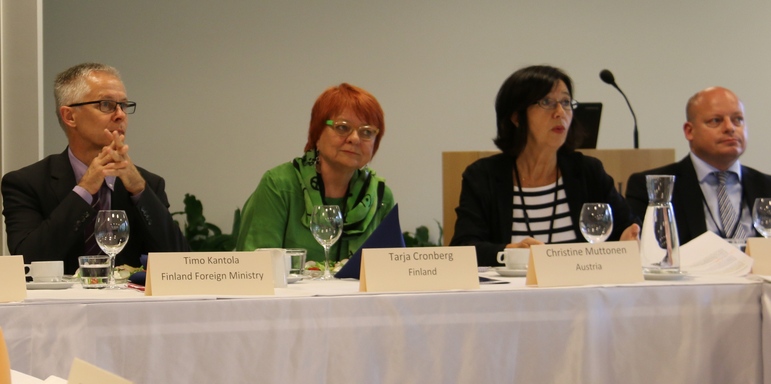On the 40th anniversary of the OSCE, its Parliamentary Assembly takes action on nuclear-risk reduction. The Assembly highlights the catastrophic humanitarian consequences of any use of nuclear weapons, and calls for multilateral disarmament negotiations under the auspices of the UN.
July 9
On the 40th anniversary of the signing of the Helsinki Document establishing the Organisation for Security and Cooperation in Europe, the OSCE Parliamentary Assembly adopted a comprehensive resolution on security in Europe covering a range of issues including human rights, environment, armed conflicts, territorial violations and aggression, terrorism and gender equality.

The parliamentary assembly, which includes the parliaments of the 56 OSCE member countries, agreed to four amendments on nuclear-risk-reduction and disarmament submitted by PNND Co-President Christine Muttonen (Austria). The amendments, which were discussed in the General Committee on Political Affairs and Security chaired by Senator Roger Wicker (United States);
- ‘Expressed deep concern at increased nuclear threats arising from the deteriorating relationship between Russia and NATO, including potential violations of the Intermediate-range Nuclear Forces (INF) Treaty, statements indicating an increased readiness to use nuclear weapons, and statements indicating potential plans to deploy nuclear weapons to additional territories in Europe.’
- ‘Welcomed the ‘Humanitarian Pledge’, initiated by Austria and endorsed by over 100 governments, that notes the catastrophic humanitarian consequences that would result from any use of nuclear weapons, and commits to ‘filling the legal gap’ for the prohibition and elimination of nuclear weapons.’
- ‘Called on all OSCE States with nuclear weapons or under extended nuclear deterrence relationships to reduce the risks of a nuclear war by taking nuclear weapons off high-alert, and by adopting no-first use policies.’
- 'Called on all participating OSCE States to cooperate in ‘filling the legal gap to prohibit and eliminate nuclear weapons’, by supporting United Nations facilitated deliberations and negotiations for multilateral nuclear disarmament, commencing with the renewal by the UN General Assembly of the Open Ended Working Group on Multilateral Nuclear Disarmament Negotiations.’

In an informal background paper to the OSCE members, PNND discussed the increased nuclear threat postures arising from the Ukraine conflict, the risks of nuclear weapons being used as a result of conflict escalation or accident, the catastrophic humanitarian consequences of any use of nuclear weapons, and current initiatives including the Humanitarian Pledge and the call for a renewed UN Open Ended Working Group to take forward nuclear disarmament negotiations.
The amendment on the Humanitarian Pledge was the most contested of the proposals, with a split vote of 29 delegations in favour, 16 against and 10 abstaining. Although this highlights a difference of opinion on the value of such a pledge, the vote in favour was much stronger than current support from OSCE governments, only 7 of which have endorsed (Andorra, Austria, Ireland, Kyrgyzstan, Liechtenstein, Malta and San Marino). The outcome of the vote could therefore help build support for the pledge from some of the governments that have not yet endorsed.

The fact that the other three amendments were adopted with overwhelming majorities gives optimism that the calls in these amendments, i.e. a reduction in nuclear threat postures, the adoption of no-first-use policies, and the establishment of a UN process to take forward nuclear disarmament negotiations, have widespread support from the OSCE parliaments and therefore a good chance to influence policy and for implementation.
PNND followed up the adoption of these amendments with a roundtable lunch discussion of OSCE member parliaments on Diplomacy, the United Nations and Nuclear Threats: Europe and the Middle East. The roundtable focused on the role that parliamentarians can play to advance the humanitarian initiative, support diplomatic solutions to nuclear-related conflicts, and support multilateral negotiations to achieve a nuclear-weapon-free world. Also discussed was how to increase public and parliamentary awareness of this issue, with a plan to support the International Screening Week of the movie ‘The Man who Saved the World’ (all delegations were moved by the movie trailer that was shown at the lunch event). See OSCE PA News Day 4.

The nuclear risk reduction discussions at the OSCE Parliamentary Assembly were held in the context of deep divisions within the OSCE over the Russia/Ukraine conflict.
Even before the proceedings opened, this dispute dominated the assembly. Finland, the host of the assembly, announced that they would not provide visas for the Speaker of the Russian Parliament Sergei Naryshkin and five other members of the Russian delegation, due to travel bans placed on these delegates by the European Union. Russia responded by boycotting the assembly completely. This did not prevent considerable debate about the Ukraine/Russian conflict in the assembly, and the adoption texts and resolutions on the issue. Some of these focused on the importance of all parties adhering to OSCE principles and the Minsk agreement. However, many also condemned Russia for both general and specific violations of these.
The fact that Russia was not in attendance led a number of members – including from Armenia, Belarus, Cyprus, France and Hungary - to abstain (or even oppose) some of the paragraphs that were most critical of Russia on the grounds that making such decisions without giving Russia the opportunity to address charges against them was itself a violation of OSCE principles.
PNND members were also active on other issues in the OSCE PA:
Hedy Fry (Canada), the Special representative on Gender Issues, presented the OSCE Gender Balance Report, organised an event on implementation of UN Security Council Resolution 1325 on women’s participation in conflict prevention and resolution, and introduced the draft resolution on ‘Women and Girls made vulnerable by armed conflict, crisis or minority status’.
Ignacio Sanchez Amor (Spain), introduced the draft resolution The Co-operative Phase in Post-Conflict Borders: New Tools and New Actors for a Broader View of the Conflict Cycle.
Torstein Tvedt Solberg (Norway) introduced the draft resolution on Environmental Challenges and Economic Opportunities in the High North. All resolutions were adopted with minor amendments.
The next OSCE Parliamentary Assembly is in Mongolia. September 15-18, 2015. Russia is expected to attend this assembly.
Air Max 1

